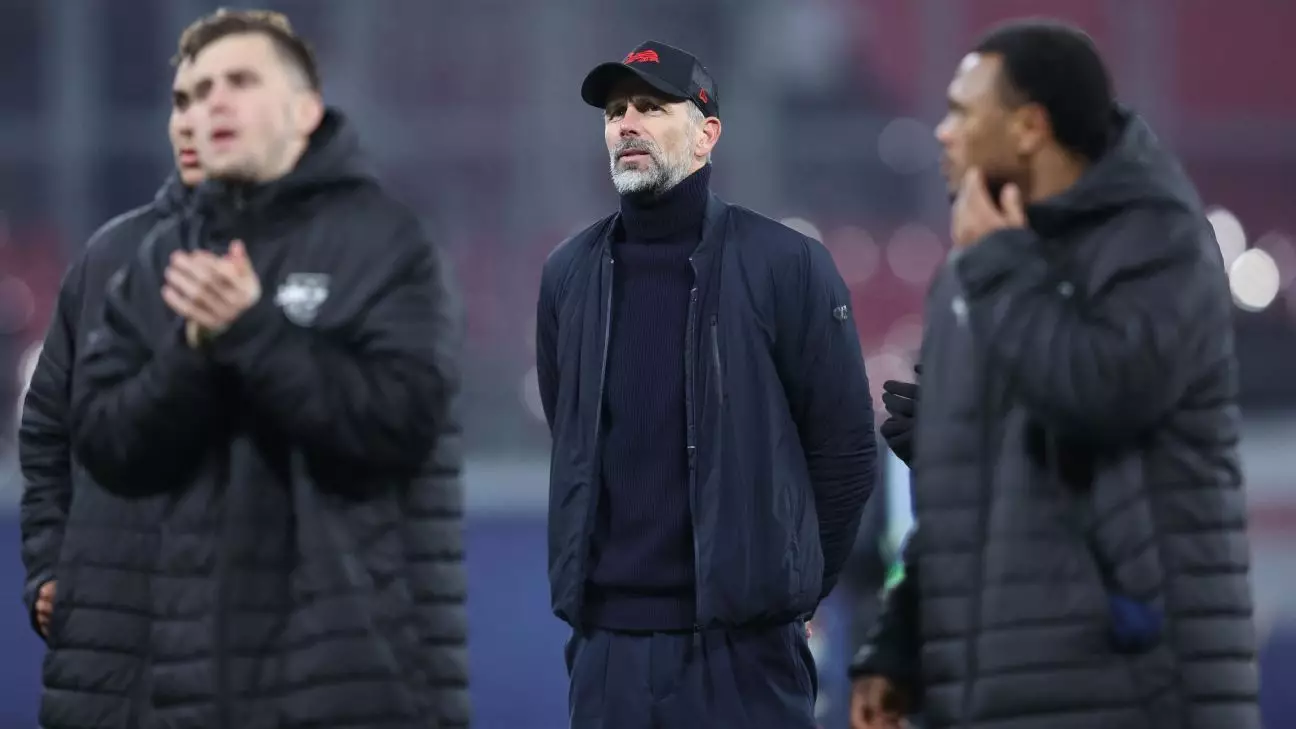The dynamic world of football is often dictated not just by the players on the pitch, but also by the management that steers the ship. In Germany, the concept of “passen,” or fitting perfectly into a situation, carries substantial weight, particularly in discussing the compatibility of coaches and clubs. Marco Rose’s tenure at RB Leipzig exemplifies this principle, where his harmonious integration with the team speaks volumes about his coaching philosophy and its alignment with the club’s ambitions.
Marco Rose’s deep-seated connection to Leipzig transcends mere geography; it’s a relationship cultivated through history and experience. Hailing from Leipzig and having previously coached RB Salzburg, Rose understands the underlying ethos of the Red Bull organization’s strategy. Unlike predecessors who adhered strictly to rigid tactical frameworks, Rose embraces a more nuanced coaching style. His approach incorporates elements of Gegenpressing and transitional football while prioritizing pragmatism—an essential trait in a sport that often hinges on adaptability. This flexibility has been paramount in his nearly three-year stint, making him the second-longest-serving coach since the club’s establishment in 2009.
In an environment characterized by swift decision-making, particularly under executive Oliver Mintzlaff, frequent coaching changes are made in response to threats or underperformance. Many coaches before Rose, like Jesse Marsch and Domenico Tedesco, faced abrupt dismissals despite some visible success. Rose, however, has managed to navigate these turbulent waters with relative stability, culminating in significant victories such as the DFB-Pokal in 2023 and a cherished DFL-Supercup win against Bayern Munich. His philosophy and performance have fostered a sense of coherence and promise, often absent in the coaching carousel that plagues many clubs.
As RB Leipzig tackled the challenges of the revamped UEFA Champions League this season, expectations soared. This new format offered an ideal stage to demonstrate their capabilities, contrasting their earlier group performances. However, the harsh reality of sports emerged, leading to a sequence of disappointments that painted a bleak picture for the future. The harsh losses against elite teams such as Atletico Madrid, Juventus, and Liverpool, along with an unexpected defeat at Celtic Park, were significant blows to the club’s aspirations. Leipzig’s failure to secure a single point from six matches underlined their struggles and intensified scrutiny regarding Rose’s position at the helm.
Injuries can profoundly impact a team’s season, and Rose was forced to navigate through challenges posed by key absences. Notably, the injuries to influential players like Xavi Simons and David Raum complicated matters. The upcoming DFB-Pokal quarterfinal against Eintracht Frankfurt loomed like a pivotal moment in Rose’s tenure. A loss could have prompted serious reconsideration of his future, but Leipzig rose to the occasion. Their performance against Frankfurt showcased the team at its best, with notable contributions from players such as Loïs Openda and Benjamin Sesko, providing a temporary respite from mounting pressures.
Prospects and Challenges Ahead
As the Winterpause approaches, conversations surrounding Rose’s future have resurfaced. Speculation about potential successors, including Roger Schmidt and Erik ten Hag, creates an atmosphere of uncertainty. Schmidt’s prior interactions with Mintzlaff instantiate the notion that Leipzig might seek an overhaul during the break. Meanwhile, as Jürgen Klopp prepares to influence Red Bull’s global strategy, the thought of dismissing a long-time acquaintance like Rose casts a shadow over future decisions.
Despite recent setbacks, Leipzig remains in contention for another DFB-Pokal title, especially after witnessing strong performances from rivals like Bayer Leverkusen and their own positive trajectory. Eliminations among other top Bundesliga clubs like Bayern Munich and Borussia Dortmund have opened pathways to potential success. The draw for the DFB-Pokal quarterfinals could present Leipzig with favorable matchups, thereby reigniting hope for silverware this season.
Looking beyond Leipzig, the Bundesliga’s ongoing narrative also includes the story of St. Pauli, who have fought valiantly to preserve their top-flight status. Under manager Alexander Blessin, St. Pauli has showcased resilience, despite initial concerns over their attacking potency. Recent performances, especially a spirited display against Leverkusen, have rekindled confidence among their supporters.
As the league progresses, the battle to avoid relegation intensifies. Teams like Holstein Kiel and VfL Bochum struggle to maintain competitiveness, giving St. Pauli a strategic advantage. Their ability to earn points in narrowly contested matches may prove crucial as the season progresses.
The landscape of football management is fraught with challenges that require a blend of tactical acumen, emotional intelligence, and an ability to adapt. Marco Rose’s journey at RB Leipzig reflects the complexity inherent in his role, a microcosm of the larger Bundesliga narrative that encompasses ambition, disappointment, resilience, and hope. As Leipzig navigates its immediate struggles and looks toward the future, the true measure of success will ultimately be determined by Rose’s ability to evolve alongside the club’s ever-changing aspirations.

Leave a Reply